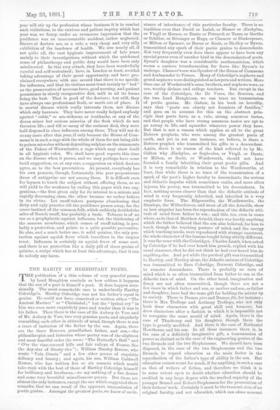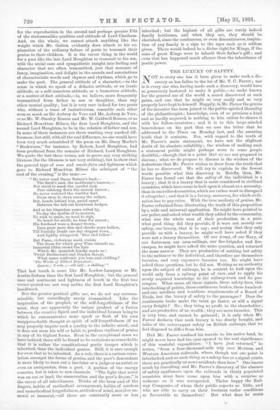THE RARITY OF HEREDITARY POETS.
THE publication of a thin volume of very graceful poems by Lord Houghton reminds us how seldom it happens that the son of a poet is himself a poet. It does happen occa- sionally. The most remarkable case is undoubtedly Hartley Coleridge's. Hartley Coleridge was not his father's equal in genius. He could not have conceived or written either " The Ancient Mariner" or " Christabel ;" but the " lyrical cry" in him was even more exquisitely pure and tender than it was in his father. Then there is the case of Sir Aubrey de Vere and of Mr. Aubrey de Vere, two very genuine poets, and singularly resembling each other in attitude of mind, though there is not a trace of imitation of the father by the son. Again, there are the three Roscoes, grandfather, father, and son,—the philanthropist and historian whose poetry was of the slightest and most fanciful order (he wrote "The Butterfly's Ball" and " O'er the vine-covered bills and fair valleys of France, See the day-star of liberty rise ") ; William Stanley Roscoe, who wrote " Vale. Crucis " and a few other poems of exquisite delicacy and beauty ; and again, his son, William Caldwell Roscoe, who has written five or six sonnets which would take rank with the best of those of Hartley Coleridge himself for brilliancy and loveliness,----to say nothing of a fine drama and some very beautiful miscellaneous poems. But these are almost the only instances, except the one which suggested these remarks, that we can recall of the apparent transmission of poetic genius. Amongst the greatest poets, we know of no in- stance of inheritance of this particular faculty. There is no tradition even that David or Isaiah, or Homer or 2Esehylus, or Virgil or Horace, or Dante or Petrarch or Tasso, or Goethe or Schiller, or Beranger or Hugo, or Chaucer or Shakespeare, or Milton or Spenser, or Burns or Scott, or Shelley or Byron, transmitted any spark of their poetic genius to descendants. Not very frequently even does there appear to have been any special power even of another kind in the descendants of poets. Byron's daughter was a considerable mathematician, which seems a curious transformation for force like Byron's to undergo. Chaucer's son was Speaker of the House of Commons and Ambassador to France. Many of Coleridge's nephews and grand-nephews were distinguished as lawyers and writers. More than one of Wordsworth's sons, brothers, and nephews were, or are, worthy divines and college teachers. But except in the case of the Coleridges, the De Veres, the Roscoes, and the two Lord Houghtons, we can trace no transmission of poetic genius. Mr. Galton, in his book on heredity, says that "poets are clearly not founders of families," and goes on to account for this on the abstract prin- ciple that poets have, as a rule, strong sensuous tastes, and that people who have strong sensuous tastes are apt to go astray in life, and squander whatever power they have. But that is not a reason which applies at all to the great Hebrew prophets, who were among the greatest poets of earth, and yet in not one instance, we believe, is there a Hebrew prophet who transmitted his gifts to a descendant. Again, there is no reason of the kind referred to by Mr. Galton why 2Eschylus, or Sophocles, or Virgil, or Dante, or Milton, or Scott, or Wordsworth, should not have founded a family inheriting their great poetic gifts. And it is very remarkable in relation to the Wordsworths, at least, that while there is no trace of the transmission of a spark of the poet's higher faculty to descendants, the serious and didactic. impulse which sometimes exalts, and more often injures, his poetry, was transmitted to his descendants. In fact, nothing seems clearer than that the didactic attitude of mind is very frequently inherited, and inherited in a very emphatic form. The Edgeworths, the Wordsworths, the Stanleys, the Wilberforces, and most of all the Arnolds, show us how singular has been the reproduction of the didactic atti- tude of mind from father to son ; and this, too, even in cases where, as in that of Matthew Arnold, there was hardly anything which the father believed that the son also believed, for him to teach, though the teaching posture of mind, and the energy which teaching needs, were reproduced with strange exactness, the whole character of the lessons taught being utterly different. It was the same with the Coleridges. Charles Lamb, when asked by Coleridge if he had ever heard him preach, replied with his usual stammer, that he did not think he had ever heard him do anything else. And yet while the poetical gift was transmitted to Hartley, and Hartley alone, the didactic animus of Coleridge was transmitted to Sara Coleridge, Derwent Coleridge, and to remoter descendants. There is probably no turn of mind which is so often transmitted from father to son as the didactic turn of mind. On the other hand, imagination and fancy are not often transmitted, though there are not a few cases in which father and son, or mother and son, or father and daughter, have had the same gift for holding the mirror up to society. There is Dumas pare and Dumas fits, for instance ; there is Mrs. Trollope and Anthony Trollope, who not only both drew characters with great skill and humour, but drew characters after a fashion in which it is impossible not to recognise the same mould of mind. Again, there is the case of Thackeray and his daughter, though there the type is greatly modified. And there is the case of Nathaniel Hawthorne and his son. In all these instances there is, in the case of a definitely imaginative gift, a transmission of power as distinct as in the case of the engineering genius of the two Brunels and the two Stephensons. We should have been disposed, in the case of the two Stephensons and the two Brunels, to regard education as the main factor in the reproduction of the father's type of ability in the son. But education cannot count for much, if for anything, in such a ease as that of writers of fiction, and therefore we think it is to some extent open to doubt whether education should be credited in any large degree with the marked capacity of the younger Brunel and Robert Stephenson for the prosecution of their fathers' work. Certainly it must be the transmission of an original faculty, and not education, which can alone account for the reproduction in the second and perhaps greater Pitt of the statesmanlike qualities and attitude of Lord Chatham.
And, on the whole, we cannot attach anything like the weight which Mr. Galion evidently does attach to his ex- planation of the ordinary failure of poets to transmit their genius to their children. It is the rarest thing in the world for a poet like the late Lord Houghton to transmit to his son, with the social ease and sympathetic insight into feeling and character that are often transmitted, just that measure of fancy, imagination, and delight in the sounds and associations of characteristic words and rhymes and rhythms, which go to make the poet. The general attitude of a character, in the sense in which we speak of a didactic attitude, or an ironic attitude, or a self-conscious attitude, or a humorous attitude, or a matter-of-fact attitude,—is, we believe, more frequently transmitted from father to son or daughter, than any other mental quality; but it is very rare indeed for two poets who, without a trace of imitativeness, resemble each other even as much as Sir Aubrey de Vere and Mr. Aubrey de Vere, or as Mr. W. Stanley Roscoe and Mr. W. Caldwell Roscoe, or as Richard Monckton Mines, the first Lord Houghton, and the second Lord Houghton, to be in the relation of father and son.
In none of these instances are there wanting very marked dif- ferences; but still, with all the real difference, no one would have been very much astonished if the poem on Mr. Stacy Marks's "Bookworm," for instance, by Robert, Lord Houghton, had been produced from the remains of Richard, Lord Houghton. We quote the last three verses, not to prove any very striking likeness (for the likeness is not very striking), but to show that the general type of ease and savoir-faire and lightness which gave to Richard Monckton Milnes the sobriquet of " the cool of the evening," is the same :- " He never read Dame Nature's book— The finch's nest, the moldwarp's burrow,—
Nor stood to mark the careful rook Peer sidelong down the newest furrow ; He never watched the warbler dart From stem to stern among the sedges, But, hands behind him, paced apart Between the tall-cut hornbeam hedges.
And so his blameless years rolled by, To-day the double of to-morrow, No wish to smile, no need to sigh, No heart for mirth, no time for sorrow ; His forehead wore a deeper frown, Eyes grew more dim and cheeks more hollow, Till friendly Death one day stepped down, And lightly whispered, ` Rise and follow.'
But Fame, victorious maid, resists The doom for which grey Time intends us, Immortal titles crowd the lists Which Mr. Quaritch kindly sends us I 'Twixt Drelincourt and Dryden thrust,
What name confronts you lone and chilling ? Tho Works of Gilbert Dryasdust ;
Quarto ; 3 vols. ;—old calf a shilling.' "
That last touch is more like Mr. Locker-Lampson or Mr. Austin Dobson than the first Lord Houghton ; but the general ease and sentiment and lightness of touch In the first two verses quoted are not very unlike the first Lord Houghton's handiwork.
But the greater poetical gifts are, we do not say untrans- missible, but exceedingly rarely transmitted. Like the inspiration of the prophet, or the self-forgetfulness of the saint, they are apparently the unique product of a fusion between the creative Spirit and the individual human being to which he communicates some spark or flash of his own unapproachable thought or spirit of self-forgetfulness (if we may properly impute such a quality to the infinite mind), and it does not seem his will or habit to produce replicas of genius in any of its highest forms. Even in the exceptional cases we have noticed, there will be found to be variations so remarkable that it is rather the constitutional poetic temper which is inherited, than the individual genius. Still, it is rare enough for even that to be inherited. As a rule, there is a curious corre- lation amongst the forms of genius, and the poet's descendant is more likely to turn out a barrister or a judge or an artist, or even an antiquarian, than a poet. A portion of the energy remains, but it takes to new channels. " The light that never was on sea or land, the consecration and the poet's dream," is the rarest of all inheritances. Tricks of the brow and of the fingers, habits of methodical arrangement, habits of careless and unmethodical forgetfulness, attitudes of mind, moral or un- moral or immoral,—all these are constantly more or less inherited; but the highest of all gifts are rarely indeed family heirlooms, and when they are, they should be cherished, since the continuous, or even discontinuous, inspira- tion of any family is a sign to the ages such as is seldom given. There would indeed be a divine right for Kings, if the sons of great Kings were to inherit their father's gift ; and even that has happened much oftener than the inheritance of poetic power.



































 Previous page
Previous page